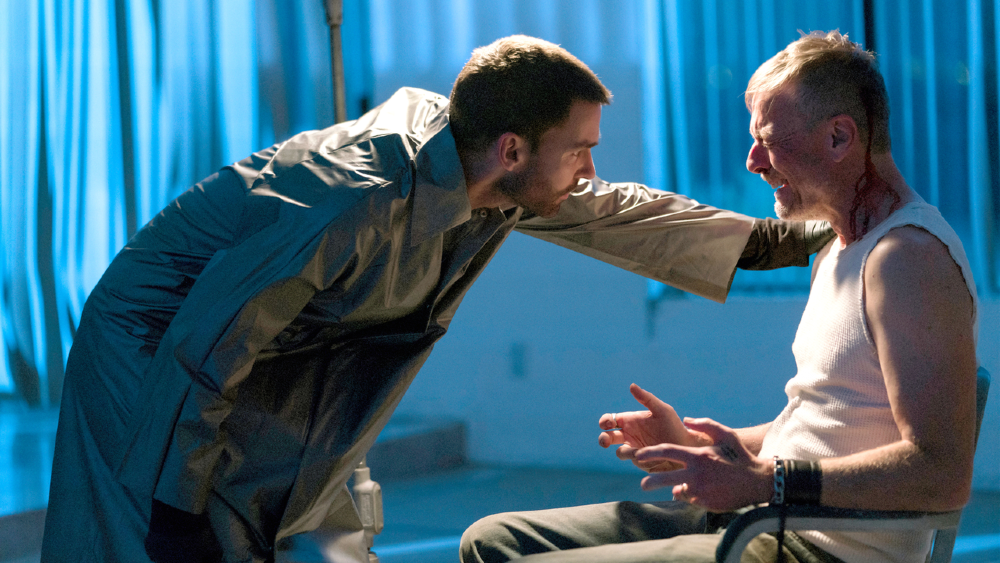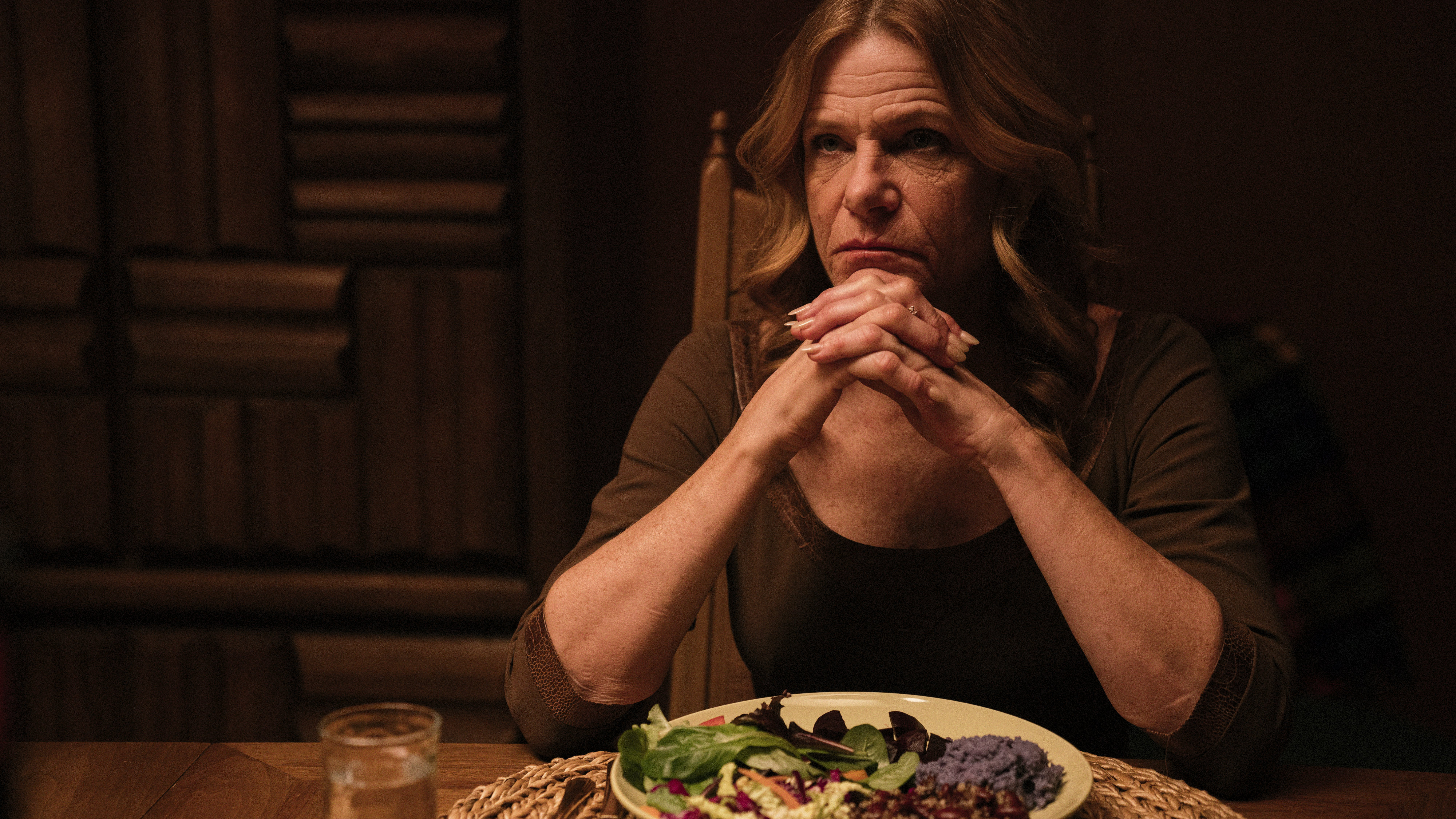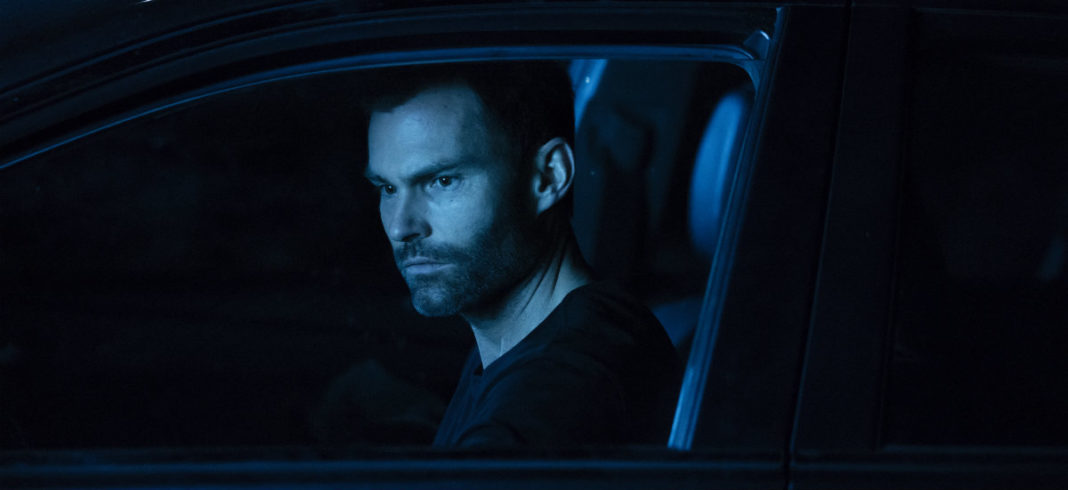It’s been twenty years since Seann William Scott got the world’s attention as the highly-inappropriate Steve Stifler in American Pie, followed quickly by roles in “turn of the century” comedy classics Dude, Where’s My Car? and Road Trip – which was also Joker and The Hangover director Todd Phillips’ directorial debut, no less! Around that same time, Scott also got part of his head sliced off in the franchise-starting Final Destination.
Like the rest of us, Scott is now twenty years older and presumably looking for more grown-up roles, which is how he ended up playing Evan in Henry Jacobson’s Bloodline. Evan is a high school guidance counselor/social worker by day, and a serial killer by night, but he doesn’t just wantonly kill. No, Evan actually uses the info from his abused students to get rid of their problem in quite a bloody way. Evan is also a new father with his wife Lauren (Mariela Garriga), and as he adjusts to that, his mother Marie (Dale Dickey) shows up and reminds Evan of his own abusive childhood… and how she taught him how to deal with abusers.
Bloodline finds its own path into the serial killer thriller genre, making it different from what we’ve seen so much over the years, from Hitchcock’s Psycho to Christian Bale in American Psycho to David Fincher‘s Se7en and his recent Netflix series Mindhunter.
The Beat got on the phone with Scott last week, and surprisingly, he is not averse to revisiting his first movie character Stifler, considering what interesting things could be done with him in the “Woke Age.”
The Beat: I saw Bloodline maybe week or two after rewatching Final Destination before it left Netflix. Obviously, it’s been about 20 years since you made that, but it’s a pretty big jump to playing Evan in this movie. Did Henry approach you to play Evan or did you have to chase after him. How did you get on board with such a different and more dramatic film like this?
Seann William Scott: It was one of the rare times where I was like, “Let me set up a meeting with people that I really want to work with.” I’ve wanted to work with Blumhouse and I loved the genre films and love everything that they do. And they’re pretty wicked at giving actors an opportunity to do something different than what most people have seen them do. I had a general meeting with Jason [Blum] and Couper Samuelson and I was like, “Guys, I really want to work with you. I would really love to do something dark. I feel like it’s something I could do really well.” And they’re like, “Yeah, let’s do it.” Then they sent over Bloodline, and I thought it needed a lot of work, but I liked the character.
It was a process to try to find a writer-director to come on board to rework the script and they got Henry Jacobson and his writing partner, and they had a great take on the movie. I think from the time that I met with Blumhouse — from the first meeting with them to them sending over the script to the actual shooting of the movie, it was about a year process – so I was part of it from the beginning. I’d always wanted to do something very different and not just a dark character for the sake of being dark, but wanting to work with Blumhouse, wanted to find something that would allow me to just show a different side.
The Beat: I keep hearing stories about meetings with Jason Blum at Blumhouse, and it seems like things actually come out of those meetings, unlike meetings at other studios.
Scott: That’s true. They just get things done and they just do it right. I don’t know if they ever fail. Every one of their movies succeeds. They have a great formula, but just the way that they pair material with the actors and filmmakers is … I mean they’re killing it
The Beat: I haven’t spoken to Henry yet, so what is his background? Has he ever made a movie like this before?
Scott: He’s done documentaries. He’s produced films, but what I didn’t know until we started shooting was that he’s also a photographer and a DP (director of photography). He’s a writer, director, DP, photographer, and it was clear in the very first day of like, “Wow, I’ve never worked with a director who understood lighting, understood how to photograph a film, lenses and all of that,” in the way that he knew it. With the DP who is crazy talented, that’s why the movie looks so cool. I think that a big part of the movie is the look of it and the way that it moves; it really sets the mood. I hope you talk to [Henry], because I think he’s going to be huge. I think he’s the real deal.

The Beat: When you knew you were going to play Evan and you had some time to prepare, what did you do to prepare? Did you watch any other movies for inspiration? Obviously, there have been some classic serial killer movies over the years, including Psycho and American Psycho to Henry and all these other ones. Did you watch any of them or had seen them before?
Scott: I think I’d probably seen all those movies before, but if anything, I was more aware of just trying not to do anything that seemed too familiar, and it’s kind of impossible. We’ve seen these kinds of characters before time and time again, so it’s how do you make it feel like its own thing? It might be impossible to do that, but how do you try to make him feel like a real human being and create your own version of it? I really don’t remember exactly what my process was other than just trying to keep it grounded in reality.
The Beat: That’s interesting, because there have been all sorts of different serial killers over time with different backgrounds, different MOs, and they usually got away with it for so long, because they weren’t acting like one might expect from a serial killer. This movie is very dark movie, so was it easy to get into that dark head and then get out of it when not filming? Was there a lot of backstory you had to create in your head for Evan?
Scott: Yeah, I worked with Henry quite a bit, and we talked a lot about the character and psychopaths, but it wasn’t like I was tortured. I had so much fun making the movie, and I just tried to be in the moment while we were doing it. I wasn’t like going home an emotional wreck, because you can’t. I’m sorry … I’m not going to be a method actor probably ever, but definitely not with a character like this. I mean what am I going to do for weeks, just think about killing people? No, no way man. I’m just going to do the best that I can.
The Beat: What about working with Dale Dickey? because I think she’s absolutely amazing. I mean I love seeing her in movies and usually she doesn’t get roles as juicy as this one. What was it like working with her and doing scenes with her?
Scott: It was awesome. I mean I’ll tell you, she’s also just the biggest sweetheart. I’m a fan of movies, so I get starstruck a lot. When I saw her, I was like, “Wow.” She’s an incredible actress and then you realize, “Oh she’s so sweet and down to earth,” and then we get to work together and we’re doing these really weird scenes. It was just a ball. I mean, the scene where she kisses me, I remember we laughed because there was one time and she did it, and it was this open mouth, soft kiss. I think my lips got stuck with her lips, and I think there’s two times where after she pulled away, I tried so hard not to break, and then I ruined the take. Finally, the one that’s in the movie is the one where I just held it together, because she and I both knew this is so fucking weird, like what kind of relationship do they have? She’s awesome.

The Beat: I loved seeing her play a bigger role in this. There’s a lot of blood and gore in this movie, so how is your stomach for that kind of stuff? I assume you’ve been doing this long enough not to be grossed out by it?
Scott: Oh, I’m not grossed out by it. I’d never done a movie like this, so I was always like “the more blood, the better,” but without it being Kill Billwhere it’s spraying everywhere, but also that’s a great movie. No, I love this stuff, and it was really fascinating to see how they did it and the prosthetics they made for the necks, when they were sliced open and you see all the inside of the throat and everything is like, “Holy shit, that looked real!” Yeah, I never got queasy with any of that stuff.
The Beat: That’s good, because it is very bloody. I was pretty shocked by that first kill and thought, “This is going to be THAT kind of movie. Okay, I’m ready.” So what else are you working on? Is there anything else you’re doing soon or looking forward to doing or?
Scott: Not that I’m doing soon. There’s two TV show ideas, both comedies, like half-hour cable or streaming, that I’m at the really, really early stages of developing. As far as films go, I haven’t read anything that I’m really excited about, but I don’t get anxious about it. This was such a fun film for me. At this point in my career, as much as I love doing comedies and I miss doing it, they’re not really making them anymore. That’s why I’m kind of excited to try to develop, really. I think I have a pretty cool idea for a comedy show, but other than that, I never feel like, “Let me just do as many movies as possible because I want to tell people I have five movies coming out that year,” and they all suck. I’d rather pick quality over quantity, so there hasn’t been anything yet that’s been exciting to me, but we’ll see.
The Beat: I talk to [producer] Craig Perry every once in a while, as I’ve known him for ten years or so. Does he ever come to you and ask if you’re interested in doing another “American Pie” movie? Or do you feel Stifler was put to rest with “American Reunion”?
Scott: I love Craig Perry, and I love that character so much. If they’re able to figure out something that was really fun and really funny, and they felt like there was still an audience for that, then I would, 100%. That character is just so much fun; I don’t give a shit. I did four of them, and I’m past the fear of being typecast, you know? It’s like, how often do you get to play a character in a comedy like Stifler where you get to do and say anything you want and get away with it, and you still kind of love him, you know? So I would do it.
The Beat: It would be interesting to see how Stifler would survive in this day and age when everybody is trying to be so PC, way more than in the early 2000s.
Scott: I know! Well, that’s the fun thing. I talked to the filmmakers, Jon Hurwitz and Hayden Schlossberg, who directed the fourth one, American Reunion, and we actually were like, “It’d be really interesting because it’s such a different time now to make that adjustment. It might be even funnier.” because you have to be more careful and it’s like, how would a guy like Stifler behave now knowing that it’s not acceptable to say the crazy shit they used to say? How does that affect him? I think it’d be a lot of fun.
The Beat: Well, there you go — go pitch that to Universal. It was great talking to you again.
Scott: You, as well!
The Beat: Hopefully your agent will be able to show Bloodlineto other producers and say, “Hey look, my client can do serious drama as well and not crack a single joke.”
Scott: Yeah, that’s awesome man. I really appreciate it. Thanks for saying that.
Bloodline opens in select cities on Friday, September 20







